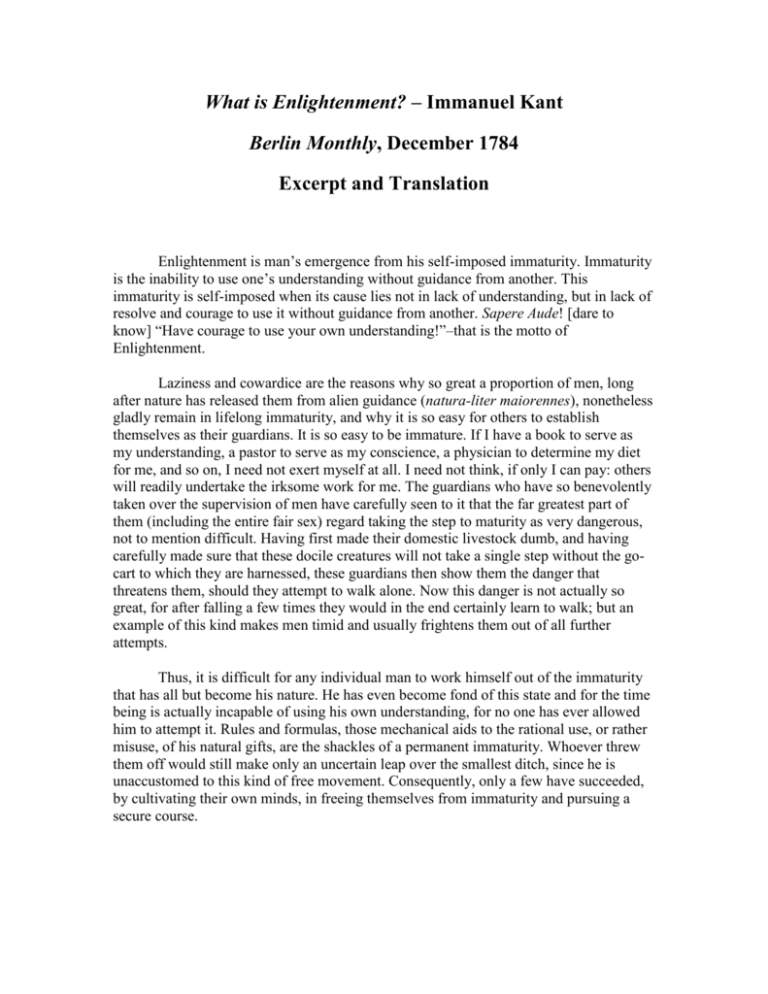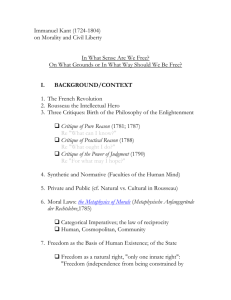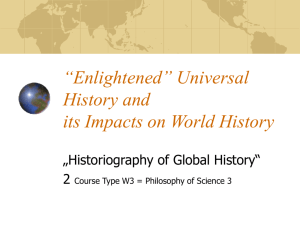File
advertisement

What is Enlightenment? – Immanuel Kant Berlin Monthly, December 1784 Excerpt and Translation Enlightenment is man’s emergence from his self-imposed immaturity. Immaturity is the inability to use one’s understanding without guidance from another. This immaturity is self-imposed when its cause lies not in lack of understanding, but in lack of resolve and courage to use it without guidance from another. Sapere Aude! [dare to know] “Have courage to use your own understanding!”–that is the motto of Enlightenment. Laziness and cowardice are the reasons why so great a proportion of men, long after nature has released them from alien guidance (natura-liter maiorennes), nonetheless gladly remain in lifelong immaturity, and why it is so easy for others to establish themselves as their guardians. It is so easy to be immature. If I have a book to serve as my understanding, a pastor to serve as my conscience, a physician to determine my diet for me, and so on, I need not exert myself at all. I need not think, if only I can pay: others will readily undertake the irksome work for me. The guardians who have so benevolently taken over the supervision of men have carefully seen to it that the far greatest part of them (including the entire fair sex) regard taking the step to maturity as very dangerous, not to mention difficult. Having first made their domestic livestock dumb, and having carefully made sure that these docile creatures will not take a single step without the gocart to which they are harnessed, these guardians then show them the danger that threatens them, should they attempt to walk alone. Now this danger is not actually so great, for after falling a few times they would in the end certainly learn to walk; but an example of this kind makes men timid and usually frightens them out of all further attempts. Thus, it is difficult for any individual man to work himself out of the immaturity that has all but become his nature. He has even become fond of this state and for the time being is actually incapable of using his own understanding, for no one has ever allowed him to attempt it. Rules and formulas, those mechanical aids to the rational use, or rather misuse, of his natural gifts, are the shackles of a permanent immaturity. Whoever threw them off would still make only an uncertain leap over the smallest ditch, since he is unaccustomed to this kind of free movement. Consequently, only a few have succeeded, by cultivating their own minds, in freeing themselves from immaturity and pursuing a secure course. Short Discussion and Evaluation (30 pts.): 1. Students will be graded for “Marking the Primary Document”. Each of the following areas done correctly will result in 3 pts. for a total of 15 pts. a. b. c. d. e. Scanning for Periphery Info. Numbering the Paragraphs Highlighting Unknown Words Underlining Main Passages Summarizing the Paragraphs 3 pts. 3 pts. 3 pts. 3 pts. 3 pts. 2. How does Kant define the Enlightenment? How does his definition compare to the one discussed in class. 3. Citing at least two pieces of evidence from the text, describe why Kant believes it is easy to be immature and why so called “guardians” exist. 4. According to Kant, why have only a few succeeded in freeing themselves from immaturity.







